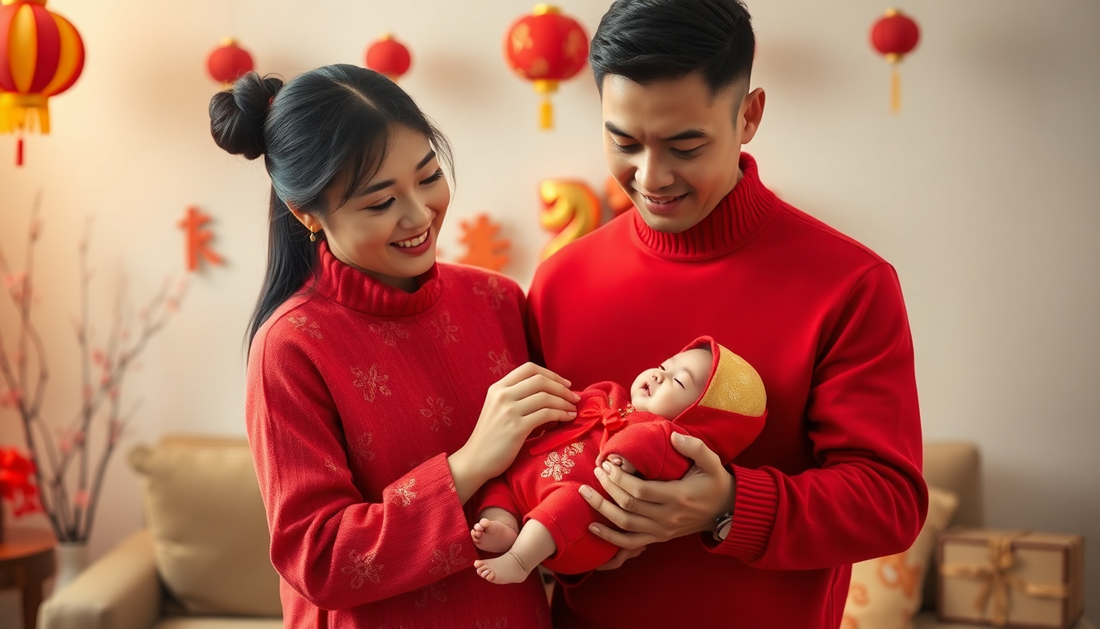As the vibrant colors of red and gold fill the air, the excitement of Chinese New Year takes over. This annual celebration holds deep cultural significance, with traditions and superstitions passed down through generations. For new parents in Singapore, navigating the customs and beliefs surrounding this auspicious occasion can be both fascinating and daunting.
With the elders watching closely, you want to make sure you're doing things the "right" way. But don't worry! We've got you covered with this list of Chinese New Year superstitions for babies that will keep your little one safe, sound, and (hopefully) free from bad luck!
The Importance of Traditions in Chinese Culture
Chinese New Year, also known as Lunar New Year or Spring Festival, is the most important holiday in the Chinese calendar. It marks the beginning of a new year and is a time for families to come together, honor their ancestors, and usher in good luck and prosperity. Deeply rooted in Taoist and Confucian philosophies, the traditions and superstitions associated with this festival are an integral part of Chinese cultural identity.
For parents, understanding and embracing these customs can help their little ones feel connected to their heritage and foster a sense of belonging. From avoiding certain activities to incorporating auspicious practices, the superstitions surrounding Chinese New Year for babies hold significant meaning and can greatly impact the family's celebrations.
Common Chinese New Year Superstitions for Babies
As parents prepare to welcome the new year with their little ones, they must navigate a web of superstitions and beliefs. Here are some of the most common Chinese New Year superstitions that parents in Singapore should be aware of:
Avoiding Haircuts
Thinking of giving your baby a cute new haircut for the New Year? Do it before the celebrations begin! This is because the Chinese word for "hair" (髮) is similar to the word for "prosperity" (發), and cutting a baby's hair is thought to symbolize cutting off their good fortune. It's best to give those tiny locks a trim well in advance. Plus, you'll have one less thing to worry about when the relatives arrive.
Wearing Red Clothing
Forget the usual pastel baby clothes—Chinese New Year calls for red, gold, and everything auspicious! Red symbolizes good fortune and wards off evil spirits, while gold represents prosperity. Avoid white or black, as they are associated with mourning. So, if your baby has been rocking that adorable red onesie, congratulations—you're already ahead of the game!
No Crying on New Year's Day
We get it. Babies cry—a lot. But according to Chinese superstition, crying on the first day of Chinese New Year is a big no-no. It's believed that tears on the first day will bring bad luck and sorrow for the rest of the year. So, stock up on pacifiers, prepare their favorite toys, and cross your fingers that your little bundle of joy stays happy and tear-free.
Pro tip: A well-timed nap can do wonders. Just saying!
Baby's First Red Envelopes (Ang Bao) Etiquette
Receiving a red packet for the first time? Teach your baby (or pretend they know) how to accept it with both hands and offer a cute "thank you" (or an adorable smile). It’s a great way to start the year with good manners and more blessings!
Auspicious Practices for Baby's First Chinese New Year
In addition to avoiding certain superstitions, parents in Singapore may also incorporate specific practices to ensure their baby's first Chinese New Year is filled with good fortune:
Choosing Lucky Names
Some parents may choose to give their baby a name with auspicious meanings or characters that are believed to bring luck, health, and happiness. These names are carefully selected to align with the Chinese zodiac and the attributes associated with the new year.
First Visit to Relatives
The first visit to the baby's paternal and maternal grandparents, as well as other close relatives, is considered an important tradition. This "visiting of the elders" is seen as a way to introduce the new family member and seek blessings for the child's future.
If you're a relative looking a gift to the baby for their first visit, check out zodiac-themed gift ideas for babies!
Special Foods for Good Luck
Certain foods are believed to bring good luck and prosperity during Chinese New Year. Parents may incorporate these lucky dishes into their baby's diet, such as dumplings (symbolizing wealth), whole fish (representing abundance), and noodles (signifying longevity).
Superstitions to Avoid
While some superstitions are embraced, there are also certain practices that parents should be cautious about during Chinese New Year:
Negative Words or Phrases
You might be tempted to complain about those sleepless nights, but hold your tongue! During Chinese New Year, it's important to avoid saying anything negative—even in jest. Words like "cry," "sick," and "poor" should be replaced with more positive alternatives. Think of it as a mini New Year resolution: positive vibes only!
Breaking Objects
Breaking or dropping objects, especially during the new year celebrations, is considered unlucky. Parents should be extra careful with their little ones to prevent any accidental breakages.
Washing Baby's Clothes on Day 1 and 2
In many Chinese households, washing clothes on the first two days of the New Year is believed to wash away good luck. That means you'll want to plan ahead and have enough clean baby clothes to last through the initial festivities. Besides, who wants to do laundry during the holidays anyway?
Modern Interpretations of Chinese New Year Superstitions
As Singapore's society becomes increasingly diverse and influenced by global trends, the way families celebrate Chinese New Year and approach its associated superstitions has evolved. Many parents today strive to find a balance between upholding traditional practices and adapting them to their contemporary lifestyles.
Some parents may choose to selectively incorporate certain superstitions that resonate with them, while others may opt to focus more on the festive spirit and quality time with their families. The key is to find a approach that aligns with their personal beliefs and ensures their baby's comfort and well-being.
Tips for New Parents Celebrating Chinese New Year
For new parents in Singapore, navigating the intricate web of Chinese New Year superstitions can be a daunting task. Here are some tips to help make the celebrations more enjoyable and stress-free:
Preparing Baby-Friendly Celebrations
Ensure that your baby's needs are prioritized during the festivities. This may involve creating a quiet, comfortable space for naps, limiting exposure to loud noises, and providing familiar, baby-safe foods.
Incorporating Traditions with Flexibility
While it's important to respect cultural traditions, be open to adapting them to suit your baby's needs. For example, you could opt for a shorter first visit to relatives or find creative ways to incorporate lucky foods into your baby's diet.
Embracing the Spirit of the Occasion
Ultimately, the essence of Chinese New Year is about family, togetherness, and ushering in a fresh start. Focus on creating meaningful memories with your little one, and let the superstitions take a backseat to the joy and celebration.
Conclusion
As you embark on your baby's first Chinese New Year celebration in Singapore, remember that the traditions and superstitions are deeply rooted in a rich cultural heritage. While it's important to be mindful of these beliefs, the most valuable gift you can give your little one is the opportunity to feel connected to their roots and to experience the warmth and wonder of this auspicious occasion. By striking a balance between honoring the past and embracing the present, you can ensure that your baby's Chinese New Year is filled with love, luck, and a lifetime of cherished memories.
If you enjoyed reading this, you might enjoy this too!

